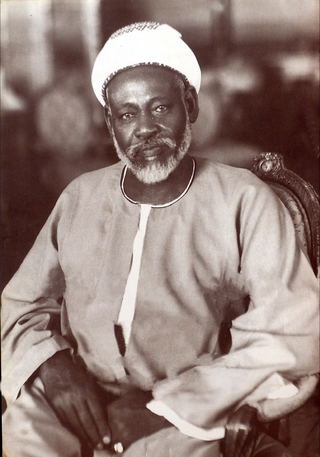
Omdurman is a major city in Sudan. It is the second most populous city in the country, located in the State of Khartoum. Omdurman lies on the west bank of the River Nile, opposite and northwest of the capital city of Khartoum. It is on the Nile river and acts as an important road hub, with the Nile boosting transportation even further.

The Battle of Omdurman was fought during the Anglo-Egyptian conquest of Sudan between a British–Egyptian expeditionary force commanded by British Commander-in-Chief (sirdar) major general Horatio Herbert Kitchener and a Sudanese army of the Mahdist State, led by Abdallahi ibn Muhammad, the successor to the self-proclaimed Mahdi, Muhammad Ahmad. The battle took place on 2 September 1898, at Kerreri, 11 kilometres (6.8 mi) north of Omdurman.

Muhammad Ahmad bin Abdullah bin Fahal was a Sudanese religious and political leader. In 1881, he claimed to be the Mahdi and led a war against Egyptian rule in Sudan, which culminated in a remarkable victory over them in the Siege of Khartoum. He created a vast Islamic state extending from the Red Sea to Central Africa and founded a movement that remained influential in Sudan a century later.

Anglo-Egyptian Sudan was a condominium of the United Kingdom and Egypt between 1899 and 1956, corresponding mostly to the territory of present-day South Sudan and Sudan. Legally, sovereignty and administration were shared between both Egypt and the United Kingdom, but in practice the structure of the condominium ensured effective British control over Sudan, with Egypt having limited local power and influence. In the meantime, Egypt itself fell under increasing British influence. Following the Egyptian Revolution of 1952, Egypt pushed for an end to the condominium, and the independence of Sudan. By agreement between Egypt and the United Kingdom in 1953, Sudan was granted independence as the Republic of the Sudan on 1 January 1956. In 2011, the south of Sudan itself became independent as the Republic of South Sudan.

Abdullah ibn-Mohammed al-Khalifa or Abdullah al-Taashi or Abdallah al-Khalifa, also known as "The Khalifa" was a Sudanese Ansar ruler who was one of the principal followers of Muhammad Ahmad. Ahmad claimed to be the Mahdi, building up a large following. After Ahmad's death, Abdullah ibn-Mohammed took over the movement, adopting the title of Khalifah al-Mahdi. He attempted to create a kingdom, which led to widespread discontent, and his eventual defeat and death at the hands of the British and Egyptians.

The Battle of Abu Klea, also known as the Battle of Abu Tulayh, took place between 16 and 18 January 1885, at Abu Klea, Sudan, between the British Desert Column and Mahdist forces encamped near Abu Klea. The Desert Column, a force of approximately 1,400 soldiers, started from Korti, Sudan on 30 December 1884; the Desert Column's mission, in a joint effort titled the "Gordon Relief Expedition", was to march across the Bayuda Desert to the aid of General Charles George Gordon at Khartoum, Sudan, who was besieged there by Mahdist forces.

Colonel William Hicks, also known as Hicks Pasha,, was a British soldier who entered the Bombay Army in 1849, and served through the Indian mutiny, being mentioned in dispatches for good conduct at the action of Sitka Ghaut in 1859.

The Battle of Shaykan was fought between Egyptian forces under the command of Hicks Pasha and the forces of Muhammad Ahmad, the self-proclaimed Mahdi, in the woods of Shaykan near Kashgil near the town of El-Obeid during 3–5 November 1883.

The Mahdist State, also known as Mahdist Sudan or the Sudanese Mahdiyya, was a state based on a religious and political movement launched in 1881 by Muhammad Ahmad bin Abdullah against the Khedivate of Egypt, which had ruled Sudan since 1821. After four years of struggle, the Mahdist rebels overthrew the Ottoman-Egyptian administration and established their own "Islamic and national" government with its capital in Omdurman. Thus, from 1885 the Mahdist government maintained sovereignty and control over the Sudanese territories until its existence was terminated by the Anglo-Egyptian forces in 1898.

The siege of Khartoum took place from 13 March 1884 to 26 January 1885. Sudanese Mahdist forces captured the city of Khartoum, Sudan, from its Egyptian garrison, thereby gaining control over the whole of Turco-Egyptian Sudan.

Osman Digna was a follower of Muhammad Ahmad, the self-proclaimed Mahdi, in Sudan, who became his best known military commander during the Mahdist War. He was claimed to be a descendant from the Abbasid family. As the Mahdi's ablest general, he played an important role in the fate of General Charles George Gordon and the end of Turkish-Egyptian rule in Sudan.

The Mahdist War was a war between the Mahdist Sudanese, led by Muhammad Ahmad bin Abdullah, who had proclaimed himself the "Mahdi" of Islam, and the forces of the Khedivate of Egypt, initially, and later the forces of Britain. After four years of revolt, the Mahdist rebels overthrew the Ottoman-Egyptian administration with the fall of Khartoum and gained control over Sudan. The Mahdist State launched several unsuccessful invasions of their neighbours, expanding the scale of the conflict to also include the Italian Empire, the Congo Free State and the Ethiopian Empire. They also faced significant internal rebellion. Anglo-Egyptian forces reconquered Sudan in 1898 and the Mahdist state collapsed following defeat at the battle of Omdurman. The last organised resistance from the Mahdists ended the next year, leading to the creation of Anglo-Egyptian Sudan (1899–1956), a de jure condominium of the British Empire, and the Kingdom of Egypt, in which Britain had de facto control over Sudan.

The Nile Expedition, sometimes called the Gordon Relief Expedition (1884–1885), was a British mission to relieve Major-General Charles George Gordon at Khartoum, Sudan. Gordon had been sent to Sudan to help the Egyptians withdraw their garrisons after the British decided to abandon Sudan in the face of a rebellion led by self-proclaimed Mahdi, Mahommed Ahmed. A contingent of Canadians was recruited to help the British navigate their small boats up the Nile River. The Nile Expedition was the first overseas expedition by Canadians in a British imperial conflict, although the Nile Voyageurs were civilian employees and did not wear uniforms.

Aba Island is an island on the White Nile to the south of Khartoum, Sudan. It is the original home of the Mahdi in Sudan and the spiritual base of the Umma Party.

The Battle of Ginnis was a minor battle of the Mahdist War that was fought on December 30, 1885, between soldiers of the Anglo-Egyptian Army and warriors of the Mahdist State. The battle was caused by the Mahdist blockade of the Ginnis-Kosha Fort, which British commanders hoped to relieve.

Sir Sayyid Abdul Rahman al-Mahdi, KBE was a Sudanese politician and prominent religious leader. He was one of the leading religious and political figures during the colonial era in Anglo-Egyptian Sudan (1898–1955), and continued to exert great authority as leader of the Neo-Mahdists after Sudan became independent. The British tried to exploit his influence over the Sudanese people while at the same time profoundly distrusting his motives. Throughout most of the colonial era of Anglo-Egyptian Sudan, the British saw al-Mahdi as important as a moderate leader of the Mahdists.

The Ansar are a Sufi religious movement in the Sudan whose followers are disciples of Muhammad Ahmad, a Sudanese religious leader based on Aba Island who proclaimed himself Mahdi on 29 June 1881. His followers won a series of victories against the Egyptians, culminating in the capture of Khartoum in January 1885.

The Battle of Abu Hamed occurred on 7 August 1897 between a flying column of Anglo-Egyptian soldiers under Major-General Sir Archibald Hunter and a garrison of Mahdist rebels led by Mohammed Zain. The battle was a victory for the Anglo-Egyptian forces, and secured for the British the strategically vital town of Abu Hamed, which was the terminus for trade and transportation across the Nubian Desert.

Frank Thomas Miller Lupton, or Lupton Bey, was a British sailor who served as an administrator in the Egyptian Sudan. He was governor of Bahr el Ghazal province in 1881 at the start of the Mahdist War. Cut off from supplies and reinforcements, he had to surrender the province in 1884. After an initial period of freedom he was enchained for ten months. He was freed but struggled to make a living, his health deteriorated and he died in poverty. He had married a local woman who survived him, as did their two daughters.

The Mahdi's tomb or qubba is located in Omdurman, Sudan. It was the burial place of Muhammad Ahmad, the leader of an Islamic revolt against Turco-Egyptian Sudan in the late 19th century.



















